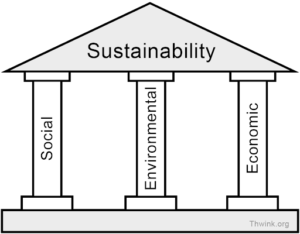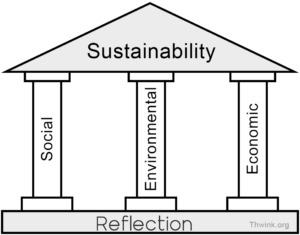Over spring break I had the privilege of seeing the latest production of Jordan Peele, Us. After Get Out I was expecting to be impressed. Us generated $70 million in sales during its opening weekend. I think a lot of people were expecting similar themes compared to Get Out, myself included and after Get Out’s success, it only makes sense that people showed up in troves to support Peele’s second film. If you haven’t yet seen Get Out, and obviously if you haven’t seen Us, this blog post isn’t for you as it will contain spoilers from here on out. Continue reading “Jordan Peele’s Us Shocks and Reads its Viewers (for filth)”
Yes, This All Mattered!
The first question on the self-reflective questionnaire given to us at the end of class on Friday was something along the lines of ‘Did this process really matter?’. After looking at it for a few moments there was a bit of confusion as to what was being referred to, however Dr. McCoy had told us to interpret it however we wanted. I saw it as referring to the sustainability module as a whole and the answer was quite clear to me- yes this all mattered! Continue reading “Yes, This All Mattered!”
Sustainability: The Problems that Arise when We Neglect to Notice Invisible Labor
Group Members: Rosa Mesbahi, Jenna Doolan, Elana Evenden, Sarah Holsberg, Mikhayla Graham, Emily Pomainville, Cameron Rustay
MOVE ONE. We’d like to start with a simple definition of sustainability synthesized from the Environmental Protection Agency (EPA) website and the official website of the University of California at Los Angeles (UCLA). According to the EPA, “sustainability is based on a simple principle: everything that we need for our survival and well-being depends, either directly or indirectly, on our natural environment. To pursue sustainability is to create and maintain the conditions under which humans and nature can exist in productive harmony to support present and future generations” (it’s also important to note the political bias of the current head of the EPA, Andrew Wheeler. Wheeler has been described as a climate denier). The EPA statement gives a good picture of the ways in which sustainability pertains to the environment, especially considering this is where our group discussion began, but it neglects to consider all the pillars of sustainability. The UCLA Sustainability Committee defines sustainability as: “the physical development and institutional operating practices that meet the needs of present users without compromising the ability of future generations to meet their own needs, particularly with regard to use and waste of natural resources. Sustainable practices support ecological, human, and economic health and vitality.” This definition acknowledges the remaining two pillars of sustainability as well: the economic and social. Continue reading “Sustainability: The Problems that Arise when We Neglect to Notice Invisible Labor”
SEE (Social, Environmental, Economic) Reflection
Group Members: Shakira Browne, Analiese Vasciannie, Sean McAneny, Tayler Thompson, Taylor VanTine, Evelyn Mendez, Sakshi Kumar
“My job is to notice…and to notice that you can notice.”–Dionne Brand
According to the U.S. National Environmental Policy Act, the goal of sustainability is to “create and maintain conditions, under which humans and nature can exist in productive harmony, that permit fulfilling the social, economic, and other requirements of present and future generations.” Keeping future generations in mind suggests an environmental component to sustainability. We can identify the three pillars of sustainability, then, as social, economic, and environmental. Within each of those domains, sustainability is seeking productive harmony and attempting to limit the harm that is done. In other words, the goals of one pillar should be attainable without compromising the goals of the other two. When there is tension between the pillars, careful reflection is required on the part of those individuals, or organizations, striving for sustainability. Because reflection is so essential to sustainable practice, we believe that reflection should be added to the definition of sustainability. In the metaphorical structure of the pillars holding up a roof of sustainability, reflection is the foundation.


Continue reading “SEE (Social, Environmental, Economic) Reflection”
Dealing With Expectations
When I first started to write this blog post, I began with “I have been struggling…” and immediately hated how that sounded. As a student and future teacher, I have decided to never use the word “struggling” when describing work performance again. Instead, I want to say “need more support with”. The reason I say that “I need more support with” is because I believe I need more support with vocalizing myself and my ideas. This past week, we were working on a collaborative blog post and I realized that I focus way to much on the expectations of my professor and peers rather than taking the time to just speak my mind and the ideas I have. However, for the split second that I did forget about the expectations of others, I voiced my opinion and my group members built upon what I had to contribute, which is always a great feeling. Continue reading “Dealing With Expectations”
Anticipating Repetition in Jordan Peele’s “US” (No Spoilers)
Talented screen-writer and actor, Jordan Peele, just debuted his new movie Us in theaters last week and the box office went crazy. Jordan Peele is fairly new to the horror movie scene but has come in strong from his 2017 presentation of Get Out which grossed $255 million dollars with a $4.5 million dollar budget. Ever since Get Out, Peele’s fans have been anticipating his newest horror film. Continue reading “Anticipating Repetition in Jordan Peele’s “US” (No Spoilers)”
The Value of Group Work
For the past week in Dr. McCoy’s class we have been doing a collaborative group blog post in small groups of around 5-7. I have also been getting a variety of assignments with group work over the past semester in other classes as well. This led me to have many different experiences while working in multiple group assignments. Over the past semester I have had some good and bad experiences with group collaboration, and it got me thinking about the idea if this is really beneficial for students. I decided to look more into this idea of group work and if it’s effective or not and why.
Sustainability: Generational Impact Seen Through Literature Study
This post has been possible through the collaborative effort made by the following members: Nicole Fyvie, Ian Oxman, Neha Marolia, Molly Byrne, Melisha-Li Gatlin, Emily Tsoi, and myself, Andrew Weber.
The topic of sustainability has been increasingly discussed among the current generation, as the environment is crucial to our existence, and yet, is suffering. Recently in class we’ve started analyzing sustainability and exploring what we can do about it. After a preliminary research, our group found that, “Sustainability focuses on meeting the needs of the present without compromising the ability of future generations to meet their needs.” When discussing sustainability, people commonly think of the three pillars which divide the complex issue into social, economic, and environmental sectors. In further research, we found that the three pillars all have different jobs when it comes to sustainability. The social pillar conveys that as citizens in this world, we all have responsibilities to promote and fix social issues such as poverty, human inequality and social injustice. The social pillar involves both saving our planet and also saving everyone on it. We tend to ignore these issues because it may not affect us directly, however, it will impact future generations. The second pillar we learned about was the environmental pillar, which is about saving us from corporate exploitation and neglect. Many people take our natural resources for granted and use them however much one would like. The degradation of the environment and its resources by irresponsible companies negatively affects us all. This pillar attempts to raise awareness on ways to decrease our carbon footprints recommending the use of renewable resources, recycling, and ways to reuse our resources that we already have so we don’t have to keep retrieving more. The last pillar we learned about is the economic pillar. This pillar is about maintaining a healthy balance of our ecosystems by using fair trade and efficient allocation of all of our resources between companies. This is another important pillar because a lot of people in the U.S. are heavy consumers and we consume an abundance of unsustainable products, which is once again increasing our carbon footprints. Continue reading “Sustainability: Generational Impact Seen Through Literature Study”
Is Sustainable Attainable?
Group members: Yadelin Fernandez, Jen Galvao, Michee Jacobs, Maria Papas, Jessica Riley, Courtney Statt, Toby Youngman
The International Institute for Sustainable Development defines sustainable development as, “meeting the needs of the present without compromising the ability of future generations to meet their own needs.” When considering sustainability, there are many markers that determine whether or not an action or means of production is sustainable. The three pillars of sustainability include economic visibility, social equity, and economic viability. According to this definition, something cannot be sustainable unless it meets all three factors. However, this is the question we kept coming back to: is it possible to meet all three of these pillars? It is hard to visualize a solution because we are bound by systems already in place which we may not even know we participate in.
The heating plant is a strong example of a complex system that many people on campus are unaware of but are simultaneously benefitting from. Prior to our visit, none of us had ever been inside of the heating plant, with the smokestack being our only indication that something was there. We weren’t even cognizant of the level of organization that heating a campus takes. As students, we often take for granted that we will be given the heat we need to be comfortable in our daily lives. As a group, this visit led us to consider the layers of production and the ways we passively participate in systems of consumption. Without having considered exactly where our heat was coming from, we also overlooked who was responsible for heating the campus. The quality of our heat is dependent upon the labor of the workers in the heating plant, yet because we operate in different spheres on the same campus, we are unaware of the work that goes into such a process. This is comparable to the interaction between the protagonist and Mr. Brockway in chapter ten of Invisible Man by Ralph Ellison. Before speaking with Mr. Brockway, the protagonist was unaware of the systematic layers that existed in the paint factory. Initially, he assumes the paint is made upstairs, to which Mr. Brockway responds, “Naw, they just mixes in the color, make it look pretty. Right down here is where the real paint is made.” In this instance, the protagonist was only aware of the process that he was shown when he first arrives at the paint factory and has no understanding of things taking place beneath the surface. Continue reading “Is Sustainable Attainable?”
Screen = scan
When talking about questioning quotidian things today in class, my mind went to a seemingly benign everyday habit that I’ve adopted: scan reading.
Everyday, I spend more time scanning emails, Instagram posts, text messages, etc, than I would care to admit. With social media, we are presented with an endless amount of consumable material about any topic that we wish to explore. Because of the frequency and over saturation of words that are seemingly unimportant, I’ve trained myself to scan read. Let’s be honest, does anyone really read though the whole caption for their fourth cousin’s baby’s birthday post? Perhaps even more dangerous than scan reading, I’ve unintentionally devalued words.
